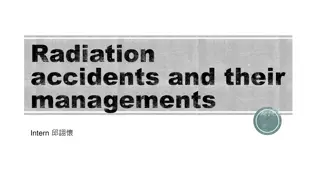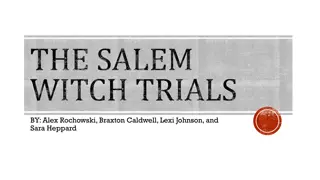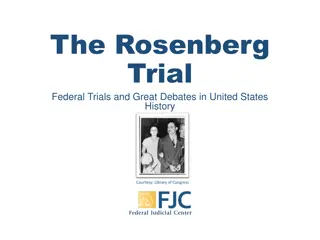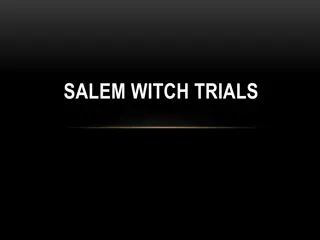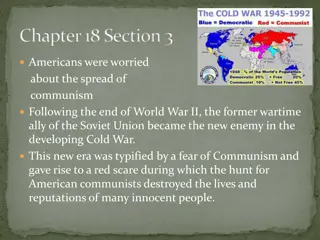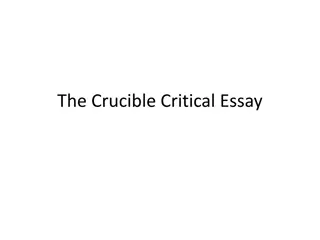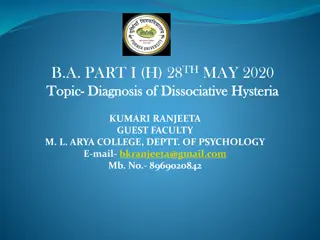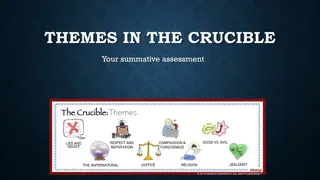Witch Hunts in East Anglia: Causes and Motives Behind the Witch Hunt Led by Hopkins and Stearne
Witch hunts in East Anglia between 1645 and 1647 were influenced by a combination of economic and political factors. The disastrous agricultural conditions of the mid-1640s, high taxation, poverty, and political turmoil contributed to the witch hysteria. Accusations were primarily driven by tensions
3 views • 17 slides
Managing Radiation Accidents: Challenges and Strategies
Radiation accidents present significant challenges in terms of managing exposure and mitigating consequences. International organizations like the IAEA and WHO provide guidelines for handling such incidents. Possible scenarios include dispersal of radioactive substances in various contexts, such as
0 views • 35 slides
Insights into the Salem Witch Trials
Discover the dark history of the Salem Witch Trials, where people were accused of witchcraft based on superstitions and fear. Learn about the beliefs, trials, possible explanations, options for the accused, and the chaos that ensued in Salem. The trials lasted from January 1692 to May 1693, revealin
0 views • 11 slides
The Rosenberg Trial and the Red Scare: Cold War Espionage and Anti-Communist Hysteria
The Rosenberg Trial during the Cold War era exemplified the heightened tensions of the time, showcasing accusations of espionage, Communist subversion, and anti-American sentiment. Julius and Ethel Rosenberg faced allegations of passing atomic secrets to the Soviet Union, amid a backdrop of fear and
0 views • 14 slides
Lessons from the Salem Witch Trials
The Salem Witch Trials in 1692 were a dark period in American history where many were accused of witchcraft based on superstitions and hysteria. Accusations were unfair and people were condemned without proper evidence. Lessons learned include the importance of the right to a fair trial, the presump
0 views • 6 slides
The Red Scare and McCarthyism: Cold War Repression in America
The Red Scare and McCarthyism were periods of intense anti-communist hysteria in the United States during the Cold War. The fear of communism led to government policies that restricted dissent, fueled by figures like Senator Joseph McCarthy who made unfair allegations and targeted various groups. Th
0 views • 13 slides
The Impact of the Red Scare and McCarthyism on American Society
The Cold War era saw the rise of the Red Scare and McCarthyism in America, fueled by fears of Communist infiltration. The loyalty review program, House Un-American Activities Committee, and infamous cases like Alger Hiss and the Rosenbergs reflect the intensity of the anti-Communist hysteria. Joseph
0 views • 12 slides
The Red Scare and Anti-Communist Hysteria in Post-World War II America
Americans in the post-World War II era were gripped by fears of communism, leading to the Red Scare and intense anti-communist sentiment. This period saw the rise of initiatives like the Loyalty Review Board and the House Committee on Un-American Activities, which targeted suspected communists in va
0 views • 16 slides
Exploring Reputation in Arthur Miller's The Crucible
A critical analysis of how reputation plays a central role in Arthur Miller's play, The Crucible, delving into characters like John Proctor and Abigail Williams. The narrative unfolds through a lens of societal values, moral dilemmas, and the lengths individuals go to uphold or tarnish their reputat
0 views • 8 slides
Themes in "The Crucible
Intolerance, hysteria, and reputation are central themes in "The Crucible." The story unfolds in a theocratic society where moral laws are intertwined with state laws, leading to severe repercussions for deviation from social norms. Hysteria fuels false accusations and reveals repressed sentiments,
0 views • 4 slides
Understanding Diagnosis and Treatment of Dissociative Hysteria in Psychology
The diagnosis of dissociative hysteria involves careful consideration to differentiate from organic illness. Factors such as emotional stress, time relationship with stress onset, symbolic meaning of symptoms, and course of symptoms in response to treatment play key roles in diagnosis. Psychotherapy
0 views • 6 slides
Analyzing Key Themes in The Crucible
Explore the underlying themes in The Crucible and analyze how they drive the plot and character development. Use evidence from the text to support your analysis through a dialectical journal. Choose from themes like Hysteria, Truth, Reputation, Justice, or Power and demonstrate how a chosen quote ex
0 views • 5 slides
History of Psychological Disorders and Treatment Methods
The chapter delves into the terms and history of psychological disorders, covering aspects like prevalence, incidence, sex ratio, age of onset, prognosis, etiology, and early beliefs surrounding mental illness. It explores the influence of figures such as Hippocrates and Galen, as well as advancemen
0 views • 15 slides

